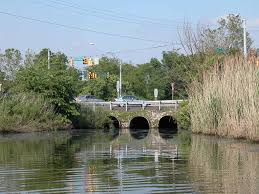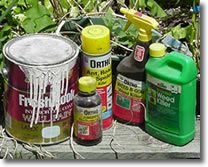
In the Home
Your everyday activities can affect water quality. Help reduce the amount of pollution that flows into our waterways by following the tips below.
- Shop for nonhazardous, biodegradable, and phosphorous-free household cleaning products.
- Rinse paintbrushes in the sink if you use water-based paints. With oil-based paints, use paint thinner to clean brushes and dispose of thinner through a local household hazardous waste program.
 See a list of local household hazardous waste facilities.
See a list of local household hazardous waste facilities. - Sweep up dirt and debris and discard them on your lawn or in the trash. Hosing off pavement washes pollutants into storm drains, which may lead to local creeks, bays, and the ocean.
- Take your car to a car wash instead of washing your car in your driveway, on the street, or in your yard. This not only conserves water but also eliminates the running off of harmful pollutants.
- Keep trash cans closed to prevent the trash from scattering.
- Store hazardous substances such as paints, solvents, and cleaners, and use them sparingly, according to the directions. Store properly to avoid spills.
- Dispose of drywall and hardened concrete, and mortar in the trash or visit a list of recycling centers.
- Do not rinse concrete or mortar from a bucket or wheelbarrow into the street; dilute the mixture with water and rinse it into an area with vegetation or gravel.
- Participate in local recycling programs. To find out more about recycling in your area.
- Dispose of unwanted chemicals at a household hazardous waste collection center in your area. Never pour hazardous materials into the street, sewer, or storm drain. For more information on hazardous waste see a list of local household hazardous waste facilities.
- Sweep up dirt and debris and discard them on your lawn or in th
- Eliminate or, at least, reduce the use of soaps and shampoos when using outdoor showers that drain to the street.
Litter & Recycling Tips
- Reduce, reuse, and recycle materials whenever possible to create less waste, which could end up on our streets and contribute to stormwater pollution.

- Pick up trash and litter on your property and put them in the trash. Always use a public trash can for trash in public areas.
- Recycle any reusable materials, especially cans, bottles, and paper.
- NEVER throw litter and debris directly into storm drains. Such debris can wash into waterways and onto beaches, and clogged drains can cause street flooding and traffic congestion.
- Always put your cigarette butts in ashtrays or solid garbage cans, not on beaches are not ashtrays. When an ashtray or garbage can is not available, store extinguished butts in your cigarette pack until you find a proper receptacle.
- Empty automobile ashtrays into the trash, not out your car window or directly on the ground. Proper disposal will help keep our waterways clean and minimize the risk of fires.
 OFFICIAL SITE OF THE STATE OF NEW JERSEY
OFFICIAL SITE OF THE STATE OF NEW JERSEY